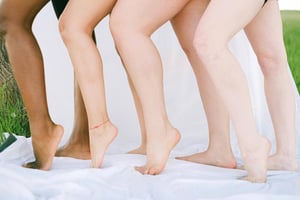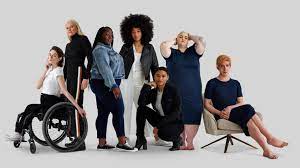Modest Fashion: a lifestyle and a mindset
Modest Fashion: A multi billion-dollar market that the fashion-industry can no longer ignore nor mistreat.
The month of March has been all about inclusivity, here at Faslet. The past few weeks, we’ve talked about the history of sizing, adaptive fashion and plus-size fashion. Nevertheless, inclusive-fashion doesn’t stop there. Today we’re introducing you to modest fashion, its representatives and how modest fashion is a lifestyle and a mindset.
First things first, what is modest fashion?
There is no one definition of what modest fashion means. However, it essentially refers to having a certain amount of awareness when it comes to covering parts of your body.
The decision to dress modestly can be a result of religious, ethnic fulfillment, but also from a feminist viewpoint, certain aesthetics or purely to achieve a form of convenience, women decide to cover up. So it goes beyond mere spirituality. It’s about comfort, empowerment and confidence.
Fashion companies such as H&M, ASOS, Uniqlo and Dolce & Gabbanahave been diversifying their clothing options by embracing inclusivity for several years. Thus, they have also added modest clothing to their assortment, to the greatest satisfaction of many consumers. However, the controversy around modest fashion is unfortunately still talk of the day in many places.
The controversy around modest fashion
If a woman decides to dress herself in modest attire, people will be quick to call her oppressed. Whatever the reason of her decision may be. Especially women who dress modestly out of religious beliefs. Muslims, Orthodox-Jewish and the women from the Amish ethnic group feel enormous pressure to dress more Western. All of this, just to try to wipe away the negative stereotypical image of oppressed women and to prevent exclusion from the community they live in.
Sometimes, this means going against all their norms and values.
Aden made a statement
In early 2021, Muslim ex-model Halima Aden spoke out on how she felt mistreated by the fashion industry.
She wears the hijab, which for those who don’t already know, is an Islamic concept of modesty and privacy. It is mainly expressed in clothing, but also in behaviors.
Aden, who was 19 years old during her debut, was afraid to speak out during shoots and shows. Through her Instagram account, she let her +1 million followers know she was quitting modeling. She stated that how she was treated was anything but inclusive and her beliefs were not handled with respect.
During shoots and shows, stylist put hats and other accessories on Aden’s head to meet her technically religious requirements, but still get a “successful shot” on screen and in magazines. One time, a pair of jeans were put over her head, which made Aden feel deeply disrespected and mistreated by the industry she works for. “Looking back now, I did what I said I would never do, which was to compromise on who I am in order to fit in.” she wrote on her Instagram.

Her exposing the industry caused a lot of fuss online, but at the same time it also created a positive twist. After Aden, a lot of her co-workers and influencers of different backgrounds and beliefs showed support and spoke out their opinions in order to demonstrate for a more inclusive fashion industry. Not only influencers, but also many fashion brands have responded to her story, demanding more diversity behind the scenes.
The emancipation of modest women
Unfortunately, It’s not just in the fashion industry and on social media that women are being berated for wearing what they feel good in. Modest fashion is also a constant topic in politics, in professional work environments and even on the beach. The burkini- and hijab ban have been a controversial issue for a long time.
Women’s emancipation starts with choosing for yourself what you want to wear. It is a powerful given that a woman can decide what she wears and who she shows it to. One woman chooses to show her figure, hair and skin, while another woman decides not to. It has nothing to do with oppression if it is a free choice. Women are nowhere as free as they are in Europe, but even Europe lacks etiquette lessons on how to handle women’s choices. The woman who chooses to dress modestly is seen as oppressed and asked to undress. The woman who decides to show a little more skin is applauded. Both women should be celebrated, not just the one that fits the industry’s ideal.
Today, more and more people realize that to be modest, also means to be brave. That a woman can make the choice to dress however she wants for spiritual or non-spiritual reasons without the opinion of opposing parties holding her back.
It’s not that the western look is the ideal beauty standard. It’s modest fashion, showing people that ideal beauty comes from within. Modest fashion is a lifestyle and a mindset. Stick firm to your values and don’t let anyone change your narrative.
Here is a list of empowering modest women:
- Halima Aden
American Somali miss-election winner. First on stage in hijab and burkini.
- The Frock NYC
Orthodox Jewish designers Chaya Chanin and Simi Polonsky are the style queens behind The Frock NYC.
- Chinutay
Instagram influencer and YouTuber with 320k+ followers. Known for her plus-size modest fashion inspiration.
- Nia Amroun
Algerian British Instagram influencer based in Riyadh.
Sources:
Modest Fashion: Inclusion or a token statement (2021)
Here’s how the fashion industry is changing to be more inclusive (2021)




